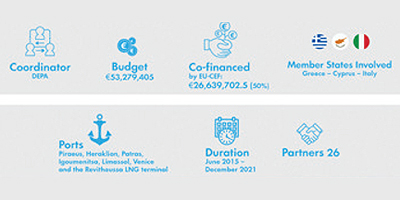Poseidon Med II is a key European
project co-funded through the
Connecting Europe Facility (CEF)
aiming to accelerate the adoption
of LNG (liquefied natural gas) in
the Eastern Mediterranean marine
transportation.
 Poseidon Med II
encompasses all the technical,
regulatory, operational, and financial
parameters to establish a viable,
efficient, and sustainable supply
chain in the region, unlocking the
necessary investments for the
establishment of the small scale LNG
(ssLNG) infrastructure in the area.
Poseidon Med II
encompasses all the technical,
regulatory, operational, and financial
parameters to establish a viable,
efficient, and sustainable supply
chain in the region, unlocking the
necessary investments for the
establishment of the small scale LNG
(ssLNG) infrastructure in the area.
Under increased pressure to follow
a greener "pathway" towards a
decarbonized future, the shipping
industry needs to turn climate
change targets into tangible action.
LNG as marine fuel can reduce GHG
emissions, thus improving air quality
at ports, while paving the way to an
environmental neutral shipping with
the use of liquefied biomethane
(LBM) and liquefied synthetic
methane (LSM).
The increasing numbers of the LNG
fueled vessels and LNG bunkering
vessels (the latter expected to rise
from seven operating in the EU
to almost fifteen vessels by the
end of 2021), testify to the growing
recognition of LNG environmental
benefits as a marine fuel. These
investments along with the expansion
of the shoreside LNG infrastructure,
provide the critical last-mile delivery
of LNG to ships.
In 2020 the Greek Ministry of Maritime
Affairs gave the "green" light to the
Port of Piraeus to start LNG bunkering
operations, either from ship-to-ship
or truck-to-ship in specific locations
inside the port area, whenever the
necessary investments are in place.
Since Revithoussa LNG Terminal has
a key role as the "logistical spring
board" of the ssLNG supply chain
in the wider region, investments on
small scale facilities on the terminal
are underway. A truck loading
station, for bunkering and off grid
consumers' supply, is currently under
construction and will be operational
by December 2021. Moreover, the basic
engineering design of a new ssLNG
jetty has been completed. The facility
will accommodate vessels from
1.000m3 to 20.000m3 and is expected
to be operational by September 2022.
Capitalizing on these achievements,
an LNG bunkering vessel registered
at the Piraeus Port, loading LNG from
the nearby Revithoussa Terminal, will
be operational by 2022.
Moreover, licensing procedures of
the small-scale LNG facilities at
the peripheral Ports of Patras and
Igoumenitsa have passed to their
2nd phase regarding approval of
the final environmental impact
assessments by the responsible
Ministries, while the approval of the
updated Master Plan of the port of
Heraklion is expected.
In Cyprus, PMII is financing the
studies for the construction of a
permanent berth for the docking of
LNG bunkering vessels, opposite to
the jetty for the FSRU berthing in
Vassilikos area.
Furthermore, with shipping
companies investing on assets that
bring them in alignment with the IMO
and EU environmental targets, PMII is
once again pioneering by supporting
the design studies for the retrofitting
of ten conventional fueled vessels to
LNG powered vessels. Additionally
Cost Benefit Analyses have been
performed for all Ports and the ten
selected vessels.
At the same time, the construction of
an innovative Semi Ballastable Barge
Transporter (SBBT) has been launched
in Italy (scheduled for delivery in
2021), which will operate in the
Mediterranean and the Adriatic Sea.
On the regulatory framework, the "umbrella" legislation regulating
the safety of the LNG bunkering
operations at the Greek Ports has
been published last year in the
Government Gazette (Presidential
Decree 64/2019). Additionally, PMII
has drafted a Practical Guide to Port
Authorities on how to maintain safety
during LNG bunkering operations.
In order to establish an economically
viable supply chain, PMII financed a
number of studies assessing the LNG
bunkering logistics' cost, as well as
synergies with other sectors, such as
supply with natural gas the industrial
and/or the urban network of Western
Greece (Patras & Igoumenitsa) and
Vassilikos (Cyprus).
Poseidon Med II, has already laid the
foundations for LNG bunkering in
Eastern Mediterranean, setting the
example for a cleaner, more effective,
competitive and sustainable marine
transportation towards a zero-carbon
future. With Poseidon Med II Eastern
Mediterranean is sailing into the LNG era.
Website: www.poseidonmedii.eu
*The sole responsibility of this publication lies with the author. The European Union is not responsible for any use that may be made of the information contained therein.